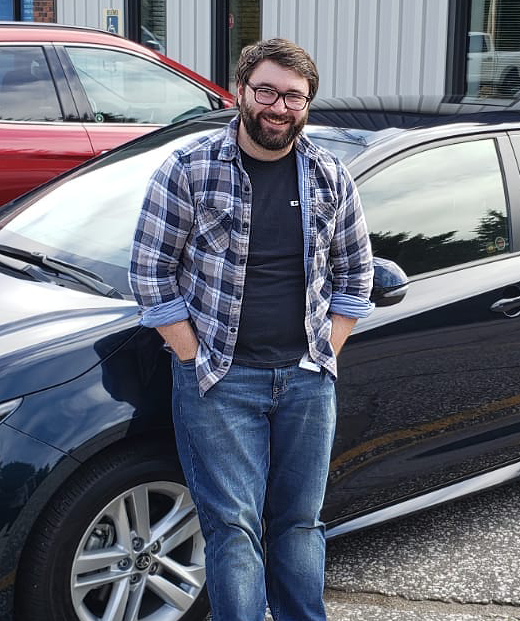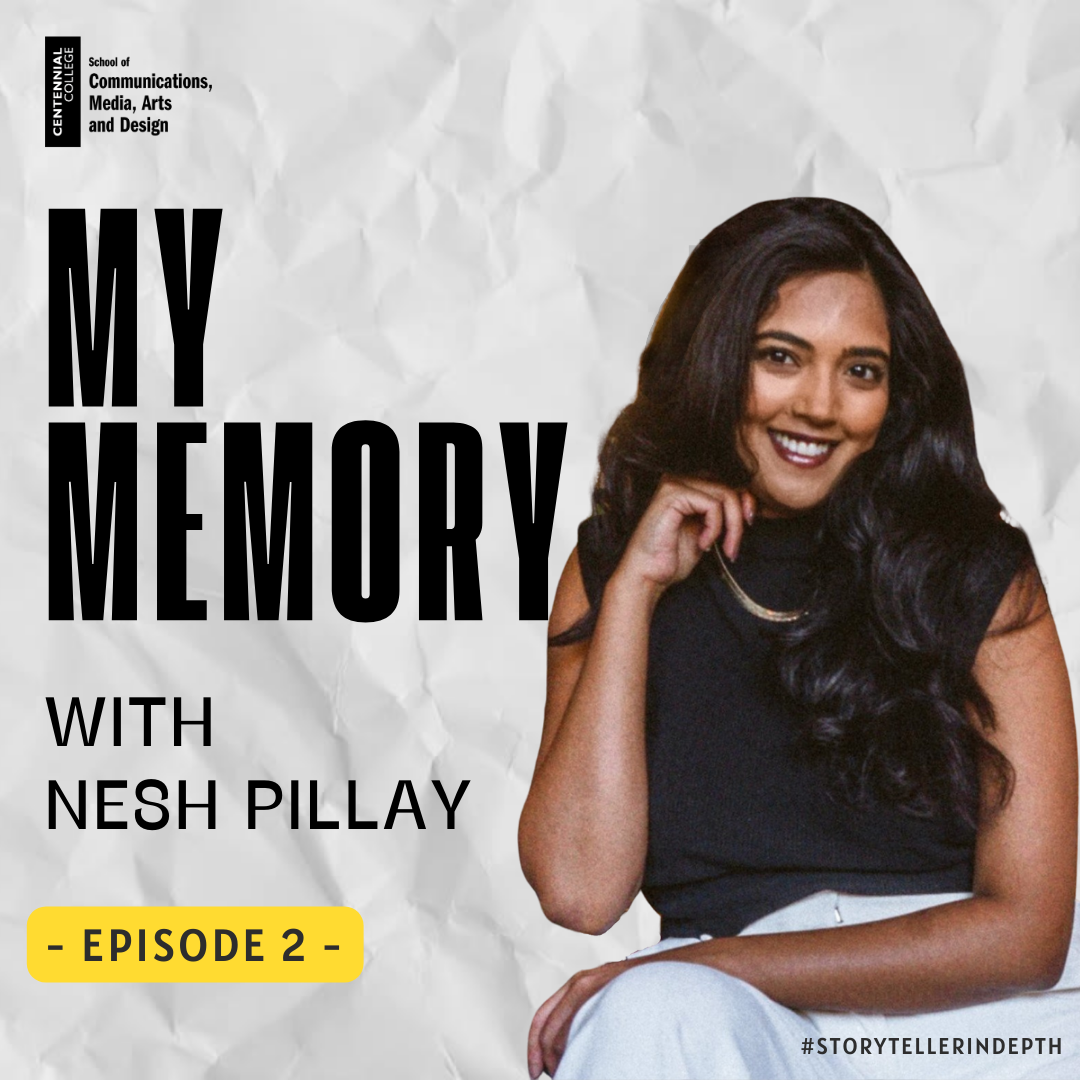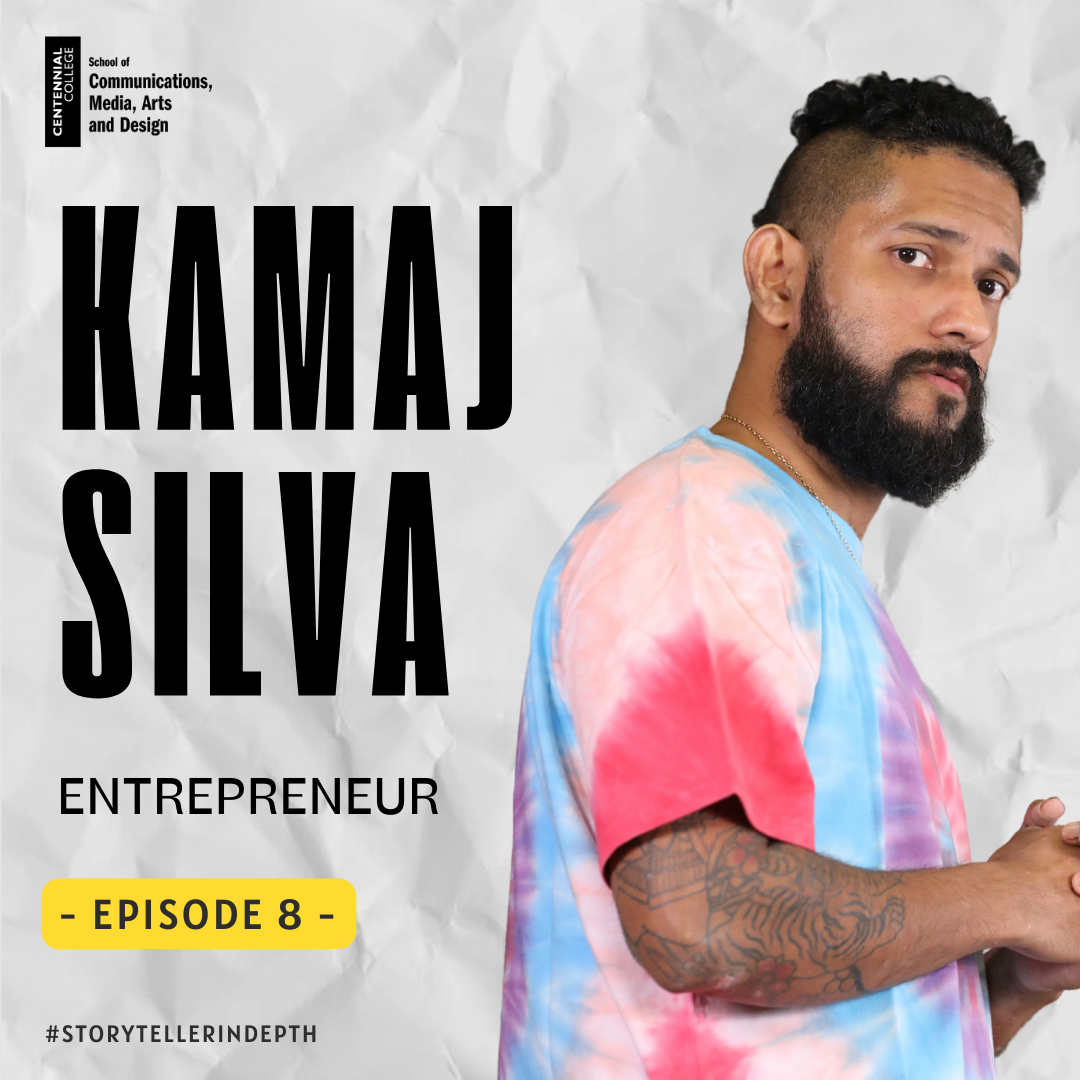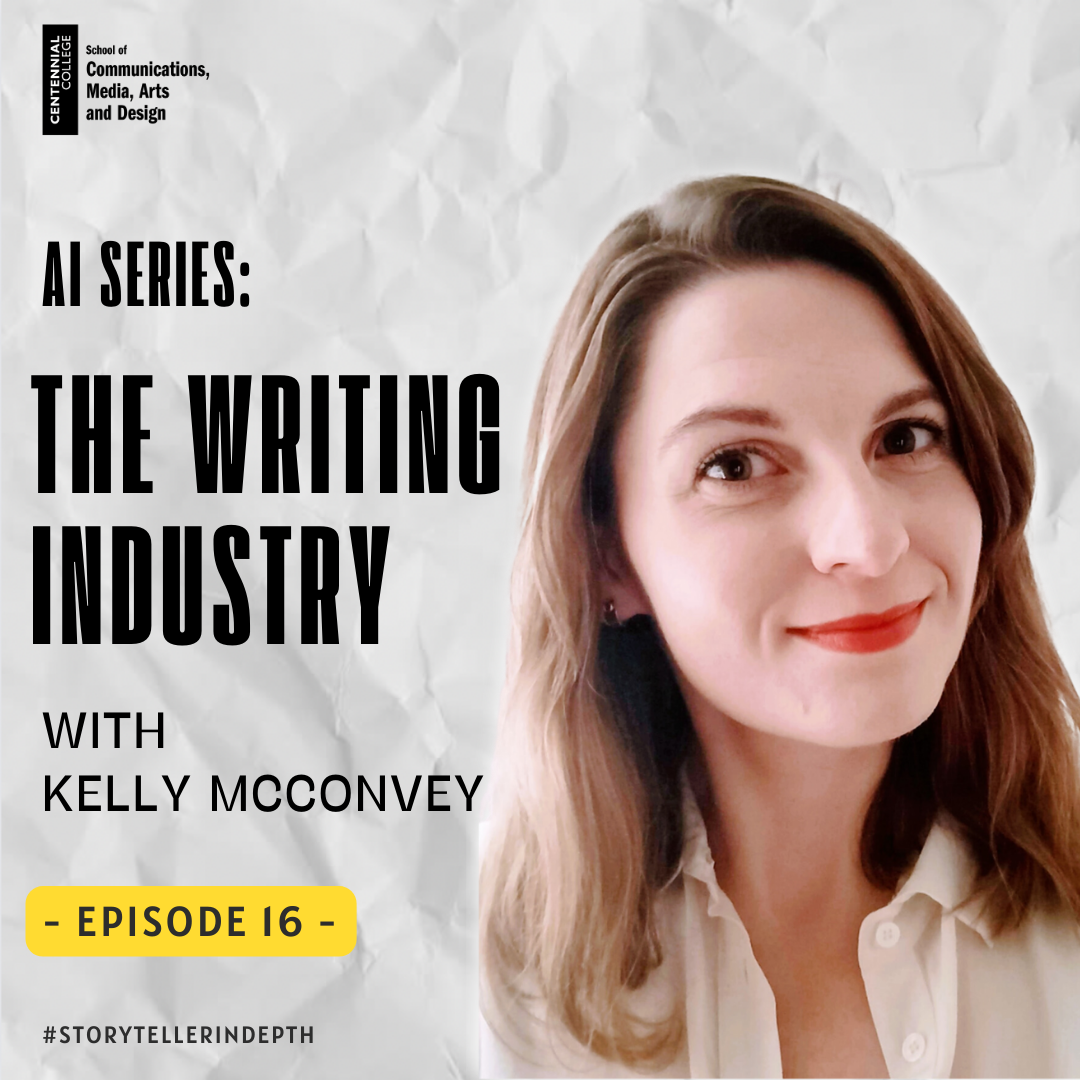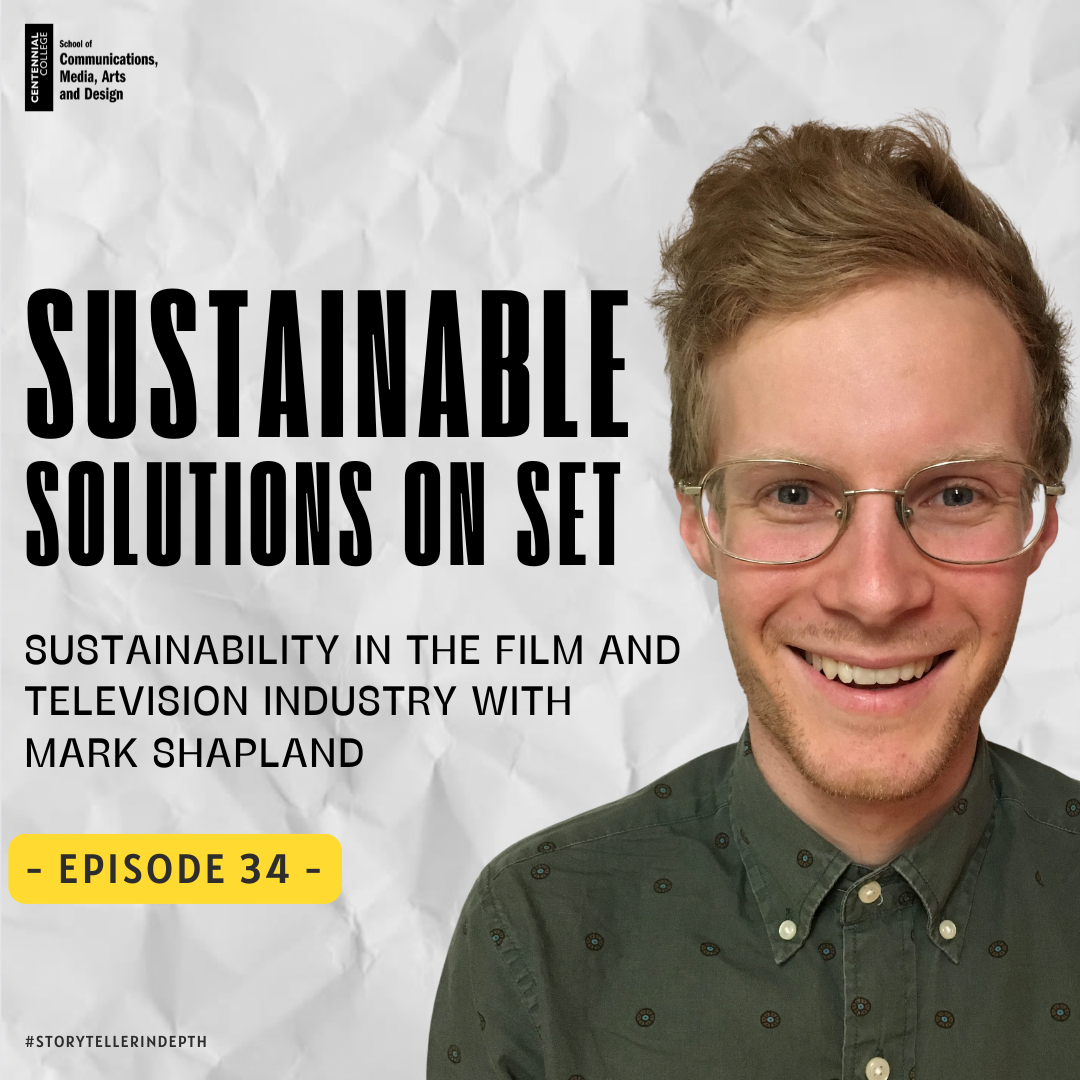Episode Transcript
Speaker 0 00:00:00 Hello and welcome to Storyteller In-Depth, a podcast where we go behind the scenes to learn more about the Story Arts Centre's, people, places, and things. I'm your host, pat Quigley, and in today's episode we'll be talking with Nesh Pillay, an instructor in our Communications Professional Writing program at the Story Arts Centre. Nesh has experienced something unimaginable, a traumatic brain injury. It has required her to restructure her personal life, her career, and even day-to-day activities. She'll be sharing with you her story of what happened, how she's doing, and her advice to those experiencing something similar. Stick around.
Speaker 2 00:00:46 Thank you Nesh, so much for being on the podcast today.
Speaker 3 00:00:49 Awesome. Thank you for having me.
Speaker 2 00:00:51 Yeah. So kind of before we kind of get started into the interview, into the, the whole process of what we're doing and the podcast, um, can you just kind of describe yourself, your profession and your career thus far? Far,
Speaker 3 00:01:02 Yeah, absolutely. It's been <laugh>, it's been a journey. So I started my, um, career in New York. So I went to grad school for journalism at the Numark School, and, um, did a little bit of, uh, documentary filmmaking. Um, I was doing international journalism initially, and then sort of fell into a role being the founding reporter for an organization called The Drum. So they cover, um, you know, the Mad Men Life. They cover advertising marketing in New York. Um, and I got this really cool backdoor look at the industry. Um, I had never thought about marketing or, or public relations or any of those things before that point. Um, afterwards I was, um, recruited actually to work for a company here in Toronto doing international communications. Um, what I didn't know <laugh>, was that the company, um, would have a massive, massive data breach within days of my arrival.
Speaker 3 00:01:57 So it was Ashley Madison. Um, they had a major data hack and, um, I was tasked with their international communications. So it sort of threw me into, um, crisis comms, um, that I did not know or want. Um, following that, um, I went on to be the head of marketing, uh, for, uh, an ad tech agency called EQ Works. Um, and then I also, and then I on the side initially started my own marketing agency. I thought, huh, if these guys could do it, I can do it. Um, so, um, that agency grew, still is in existence today, um, and has been operating ever since. Beyond that, I've led marketing teams for multiple sort of tech organizations, uh, both public and private at, uh, different levels of growth.
Speaker 2 00:02:44 Wow. You're definitely a, a very accomplished person, <laugh>.
Speaker 3 00:02:48 Thank you. Yeah, and I teach at Centennial, which I love. It's probably my favorite thing that I do, believe it or not.
Speaker 2 00:02:54 Yeah, yeah. So can you talk a little bit about that? Like what do you, what do you teach at Centennial College?
Speaker 3 00:02:59 Yeah, so I teach two courses. I teach, uh, web copywriting and, uh, digital brand storytelling. Um, and yeah, no, I, I I really love it. What it does is it, um, it puts together every part of my career, if that makes sense, like the journalistic part with the marketing part. And I also try to integrate some entrepreneurship and things like that into my courses. Um, I wanna make sure that my students don't, don't just know how to do things, but they know how to strategize so that they're positioning themselves for leadership roles if that's something they choose. Um, yeah, those are my two courses.
Speaker 2 00:03:34 So can you share some details about your memory loss from when you were first experienced, the symptoms and explain what occurred to listeners who might not be familiar with it?
Speaker 3 00:03:45 Yeah, so oof, um, to, to preface, I've had a series of concussions in my life. It's just something I've lived with. I was nine when I was in a, a fairly serious car accident in South Africa, and my, my head sort of opened up and, um, but at the time, nobody knew anything about head injuries, at least not in the way they do today. Although, to be fair, they don't know that much today. Um, so nobody really said the word concussion or anything like that. The hospital brought in a plastic surgery surgeon to fix it up and make it look good. And if you feel my forehead today, you can still feel sort of the cracks in the skull. Uh, but beyond that, there wasn't really anything throughout the years I've had, you know, your normal bumps, bruises, falls like people do, but because of that initial head injury, they've all resulted in concussions.
Speaker 3 00:04:35 For me, I guess that I may have had five to six concussions at this point. Uh, when it comes to the memory loss thing about memory loss is you lose your memory. So I don't remember how I hit my head. Um, it was very scary to even diagnose it at first, but it was a normal day. I believe it was a weekend in October. I, I, I don't actually remember it. So <laugh>, this is what has been told to me. But, um, I grabbed coffee with my partner in the morning, um, and then I s we watched a movie, Marie Antoinette, don't remember any of it. Um, and about halfway through I said, I don't feel well. Something feels weird. I wanna take a nap. And when I woke up from that nap, I forgot everything. By the end of that day I thought I was 17. I, um, forgot who my partner was and my daughter. And, um, it was, it was quite the experience.
Speaker 2 00:05:28 Wow. That's, I can't e i I can't imagine it, honestly. It that must have been very scary for you.
Speaker 3 00:05:36 It was, um, what was also happening at the time is that my memory was resetting every minute. So a lot of people compare my partner and my love story cuz I fell back in love with him to 51st states. But my family called me ten second Tom, I don't know if you've ever seen the movie, but there's a guy whose memory resets every 10 seconds that was more like me than Drew Barrymore. Um, and so that part of it was terrifying because once a minute I would look around and I, I knew something was wrong, I knew something was up, and so I, I was just worried. And I, you know, you never think that something's going on with you. And so I, I, I, I once a minute would look around and wonder why I'm at my parents' house and why everyone's looking at me like this. And then someone would explain it to me and I'd be calmed and then I'd, it would happen again. So, um, you know, I don't have a lot of memories from those months. Um, but I do remember the fear.
Speaker 2 00:06:28 Oh, for sure. So in what ways has your life changed as a result of this? Personally and professionally?
Speaker 3 00:06:35 Yeah, I mean, professionally, I've basically scaled back from everything. The only thing I'm still doing is, is teaching my courses through Centennial. Um, and it, it, it, it actually opened up some opportunities for me to work with people who've had concussions, who've, uh, had brain injuries, have had memory loss. Uh, cuz what I've learned, uh, from sharing this story on social media is that I'm not alone. You know, I really thought I was alone with it, but there are far too many people who have almost the exact same story as I do. So I'm definitely focusing my career and my personal life in that direction. Um, you know, from a personal perspective, I just have to monitor and value my time a lot. So I spend most of my time sleeping. Um, my brain is still healing. Um, and then, you know, I, I reserve pockets of time for things, so I'll reserve a pocket of time to do my office hours or if, if some students wanna have extra chats, I'll reserve a pocket of time for that, a pocket of time for this. Uh, but that's really what my life looks like now. Um, it's very different from when I was running around and doing everything, but you have to adjust.
Speaker 2 00:07:45 Oh, for sure. And so Canada, can you outline where you are today in terms of your recovery?
Speaker 3 00:07:52 Absolutely. So, um, my short-term memory, I say better as in it's better than it was. I know I'm not 17 years old, I'm not crying every time I look in the mirror <laugh>, so that's better. Um, but a lot of weird things. So a few months, it's a block of memory. I won't, I won't get back. I wrote in a journal, so that was great cuz I have that, um, memories from before. That time, not everything has come back. So if I were to describe your, my memories as a house, I can remember maybe the basic structure, um, but I don't remember what's in the house. So certain people will say, Hey Nesh, do you remember me? And oftentimes I don't until they come up to me and say, Hey, do you remember me? Because that serves as a trigger. And then it's like a little man in my brain goes down to a dusty basement, opens up a B box, and we see what memories are there.
Speaker 3 00:08:43 And oftentimes I'll remember the people, but I may not remember individual interactions we've had. Um, there are certain friends who prior to this I was very, very close with, um, because of bonding. That may have happened years ago and I don't feel quite as emotionally connected to those anymore. Uh, it's just a lot of strange things like that. Um, because I forgot October, I had to find out that the guy who played Hagrid died twice. And both times I was devastated <laugh>. Um, but yeah, that's where I am with that. But you know, I am also experiencing just regular concussion symptoms. So that's headaches, that's nausea, that's um, you know, sleep issues, having to sleep a lot, but also struggling to fall asleep. Um, the list when it comes to, of symptoms, when it comes to brain injuries just goes on and on and on because I mean, your brain controls everything. So, um, you know, emotional dysregulation, um, you name it.
Speaker 2 00:09:43 Right. And you were, you were saying earlier, like you were, you've ex you've shared a lot of your experience online mm-hmm. <affirmative>. So can you share your motivation behind wanting to tell your story and what kind of responses have you gotten?
Speaker 3 00:09:55 Absolutely. So, um, I first did it mostly as a challenge to myself. Um, putting together that two or three minute TikTok video, um, was something I wanted to do to let my friends and family know the why I had been missing for months. Right? I wasn't responding to texts, calls, anything like that, that was too heavy on my brain. Um, so that's really why I did it. Um, and you know, for my journalism days I like editing video. Um, so it must have taken me maybe six weeks not to record it, but I had all the footage. But to put it together, it was a really big challenge for my brain. Um, and you know, prior to that, I think I had maybe less than a thousand TikTok followers and I'm now at 41,000. Um, it's, it, the response has been really overwhelming. So there are different components that people have, have, um, there are different components that have really, um, affected people.
Speaker 3 00:10:52 Sorry about that. Um, so for example, my, uh, there's, you know, the love story, the 51st states components, the, the forgetting someone and falling back in love with them. It's funny, it's got heart. Um, but then again, as I mentioned earlier, there's a massive community of people who are living with, um, things like dementia, Parkinson's, it, you know, um, we're talking about all of these different conditions. Of course, TBI is traumatic brain injuries. There are all these conditions, but the feelings seem to be the same. You know, people feel like they're maybe not getting, uh, help and support from the medical community. People feel isolated, people feel depressed because their lives have changed so drastically. And so what I've found is that now I get to build this community of these people. And so even though we all feel alone now, we can feel alone together. And that's, that's been really the best part of this.
Speaker 2 00:11:47 Awesome. So have you found that social media platforms have a way of like igniting the community more?
Speaker 3 00:11:55 Yes, they do. When done, um, strategically social media is one of the things that I teach in my class. Um, so, you know, while this this initially grew, um, organically, I've definitely implemented some strategy into it. Absolutely. Social media has the ability to bring people together, it has the ability to build communities. But, um, the thing with social media is that can happen for any topic, right? It's not just people who want to share love to other people who have ha who have neurological conditions. It could be serial killers who wanna share love with other serial killers. So it's a double-edged sword when it comes to social media. Um, but yeah, it absolutely has that, um, opportunity. And this is one of the things I do explain to my students is it also depends on what platform you're using. So for example, the exact same story got not even a hundredth of the, um, traction on Instagram that it did on TikTok. So it also depends on how saturated a platform is for something to even have that opportunity to make, uh, such a great impact.
Speaker 2 00:13:06 Oh, for sure. Yeah. I mean, I'm sure we could talk a lot about social media and the different impacts that it has on the different thing. Like it just, so social media's a scary place in, in a lot of ways and sometimes, so it, it's interesting to see your point of view on on on that.
Speaker 3 00:13:23 Yeah, absolutely. I mean, it's, it, it's, I'm both a consumer and a user of social media, but then I'm a marketer and I really like to get in there with the, the strategy. You know, some of, some of what we do with marketing, um, cuz let's be honest, what we're doing is we're influencing public perception and, and some of the things that can be done, I mean, it blows my mind cuz it's so smart. But as a consumer I'm terrified, <laugh>. So I think for consumers and users of social media, it's always important to look at things critically whenever you're served something, um, what's the plan? Like what is, what's the end goal? Follow the money. Uh, you know, we teach strategy to our students so that they can look at it and, and, and see, see a single post as part of a larger strategy.
Speaker 2 00:14:08 Right. So going back to, uh, you know, the experience and, and your memory loss. So what, what feelings have you experienced now having shared your story?
Speaker 3 00:14:20 Um, great question. Um, I feel, I think, I think the story getting this much traction, I mean, in addition to the social, I think it's been published in more than a hundred, 200 news organizations worldwide. Um, for me it's hope, um, because if this wasn't happening, I would just be sleeping all day doing nothing else. Um, so it gives me hope that there's a, a future for myself, um, but also hope that I can really help people. I mean, that's what I've always wanted to do was reach people and, um, help them feel seen. So it's definitely, um, been like a guiding light for me during this. Um, on the other side of it, and I always tell my students consistency is key. Um, there's now a pressure, right? Um, what, what interesting content can I, can I provide to people when I'm in bed 20 hours a day? <laugh>. Um, so there is that pressure. Um, I recognize that not everyone gets this opportunity in such an organic fashion. So I don't want to let people down cuz now there are people who are looking to me for hope. Um, and so yeah.
Speaker 2 00:15:34 Have you found that it's contributed to your recovery in any way?
Speaker 3 00:15:38 It certainly has. I think again, just, um, having things to do, um, really, really has helped my recovery. And I think having the network, um, to, to share this with has helped my recovery. But I mean, you know, it doesn't, it doesn't help my physical symptoms. I, I could argue that the pressure to perform, um, probably hinders, <laugh>, um, or, or, uh, hinders my recovery in some ways as well.
Speaker 2 00:16:07 Wow. So you were talking about, you know, your students and as an instructor for the Story Arts Centre, have you found that your approach to teaching is needed to change at all? And what has your experience been like getting back into teaching?
Speaker 3 00:16:21 Absolutely. I should actually share this story. So the day I, it was one of the day, so I can't fully remember this, <laugh>. So again, I remember certain parts, but a lot of this is just what I've been told. But I do know that one of the days that this happened, maybe the day after when I was in the hospital, um, I was supposed to be teaching. Um, and so my students naturally started to message me. And, uh, one of the things that happens when you have a brain injury, your brain's an overdrive, everything's scary, everything makes you anxious. Um, and so these messages are making me anxious and I also don't know what they're for. So I turned to my sister and I'm like, what is this? She's like, you're a teacher, you teach. And I go, what do I teach?
Speaker 3 00:17:05 And she goes, public relations, marketing this. I'm like, I don't know how to do any of that. I'm 17, what are you, what are you talking about? Um, so that was really, uh, terrifying. But what was, what was amazing was that my family, I believe, um, emailed, uh, Kelly, who, who's uh, the head of our program and she was, you know, she immediately just went into, um, empathy mode. She said, you know what? Do what you need to do. Um, for me that meant taking a couple of weeks. It, it, it took me a few weeks to get to the point where I knew I wasn't 17 anymore and could sort of teach day to day. And it was just one online course that I was teaching at the time. Um, and I had already done my lesson plans. So it, that really helped.
Speaker 3 00:17:55 Um, you know, my students also had to be incredibly gracious because, um, I remember the first little bit of grading I had to do, um, for an assignment. I owed them assignments. And gosh, I think it took me two weeks to grade and it would every day. And I would basically grade till my headache was so bad, I was crying, and then I would have to sleep and then wake up and grade, you know? So, um, in terms of what it's taught me as a, as a teacher, I mean, I think more, more as a professional is it's, it's taught me that my job is not real life. I mean, I love my students and I do this part of it because I, I really do enjoy it. Um, in fact, the producer of of this show was once one of my students, and this makes me so proud.
Speaker 3 00:18:44 But, um, I really do enjoy that. Um, but beyond that, recognizing that there will be times in your life where you just have to shut your laptop off and work goes out the window. I mean, I lost my agency, lost clients during this. And, um, because at the end of the day, what really matters is your life individually. And I think this is something that students can, can really relate to because I know there's always those points in the semester where every student is like just borderline in tears all, all day, and I've been there too. Um, and I think it really helps to be able to step back and know that even though this is important and it's a big part of your future, it's not your whole life.
Speaker 2 00:19:30 For sure. Yeah, I mean that's, it's, it's really, really good advice. And that was actually my next question for you was to ask if, you know, you had any advice or important reminders, uh, to someone who might be experiencing something similar to yourself or know someone who is recovering from an impactful experience to their health?
Speaker 3 00:19:49 Absolutely. I mean, I think that, you know, for both people going through something like this or people who know someone, it's just show kindness both to that person and to yourself. I mean, invisible disabilities are especially rough. I get told all the time, you know, you look fine or you sound fine today, but the day prior I could have body tremors so, so severe that I can't walk or talk. It's just, that's not always seen. So definitely show kindness to people. Let people advocate for themselves and say, Hey, this is how I'm feeling, and believe them. Um, and then on the flip side, if you are a caregiver, being a caregiver is so much work. It's, it's, I I cannot imagine, um, I feel worse for my family and friends right now than I do for myself. So again, show kindness to yourself and and beyond all of this, regardless of if you know someone going through this or you've gone through it, um, this has really highlighted the importance of implementing boundaries for me, me, um, I've always been one of those people where I, there's that little guilty nagging voice in the back of my head where I, I know I probably should draw a boundary either per personally or professionally, but I don't, cuz I don't wanna seem like a jerk or whatever it is.
Speaker 3 00:21:03 Um, when this happened, me creating boundaries became a matter of life and death because if I didn't create certain boundaries, you know, I would say my brain's gonna get better or it's gonna get worse. But worse is there aren't many things worse than this that can happen to your brain. So I really, really had to draw firm boundaries and, and I've been thinking to myself, why haven't I been doing this for years? Why haven't I valued my life and my time and myself enough to do this? Um, so, you know, I would say to listeners, draw boundaries before you lose your memory.
Speaker 2 00:21:39 <laugh> <laugh>. That's good. That's good advice. And I'm sure it's going to like really play into your future as well too, right?
Speaker 3 00:21:48 Yeah. Oh, absolutely. Um, I've definitely been drawing those boundaries. Um, yeah, a lot of, a lot of what I learned on this journey, i i is really going to change. I think, I think the trajectory of my life is, is much different now than it was a few months ago.
Speaker 2 00:22:03 Right. Well thank you Nesh so much for being on the podcast today. It was wonderful to chat and to, to learn more about your story.
Speaker 3 00:22:12 Absolutely. Um, yeah, I'm just, I'm really honored actually. Uh, <laugh>, you know, the, the, the New York Daily News reached out and that was fine, but when Centennial reached out and it was one of my former students, I was so excited. So thank you for having me.
Speaker 2 00:22:32 Thank you so much Nesh for sharing your story with us. We truly admire the strength you have shown throughout all of this and the advice you share to something we can all carry with us forward into the future. If you wish to learn more about Nesh and her story, you can follow her on her TikTok at P I L L A R dot n e s h. Until next time, I'm your host Pat Quigley and this is Storyteller In-Depth.
